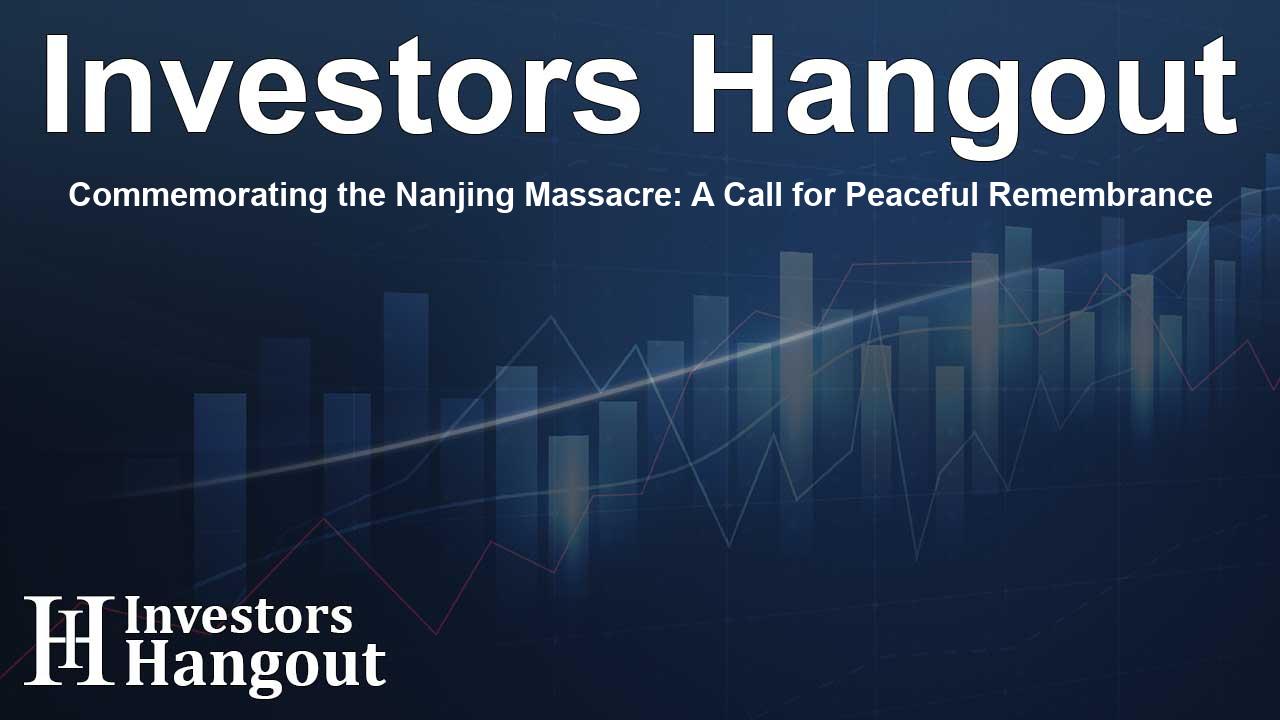Commemorating the Nanjing Massacre: A Call for Peaceful Remembrance

Commemorating the Nanjing Massacre: A Call for Peaceful Remembrance
The Nanjing Massacre, a horrific chapter of history, serves as a stark reminder of the atrocities that can arise during wartime. This event remains etched in the collective memory of those impacted by the tragic loss of life and the enduring call for justice, understanding, and international peace. As we reflect on the past, we commit ourselves to ensuring such violence is not repeated.
Historical Context of the Nanjing Massacre
In 1937, Japanese forces overtook Nanjing, leading to the deaths of over 300,000 Chinese civilians and unarmed combatants during a merciless six-week span. This dark time was marked by intense violence and suffering, becoming a symbol of the broader struggle against imperialism and inhumanity. Remembering the Nanjing Massacre is crucial not only for understanding China's past but for recognizing human rights atrocities that occur worldwide.
Publication and Research on the Nanjing Massacre
Recently, a wealth of literature and research focusing on the Nanjing Massacre has emerged, bridging cultural and language barriers. Scholars and organizations delve into this painful past, shedding light on its implications for modern society through platforms such as the Journal of Nanjing Massacre Studies. This quarterly journal, recognized both in China and internationally, is a cornerstone of educational endeavors, striving to present the factual account to diverse audiences.
Engaging with Global Audiences
Since its inception, the Journal of Nanjing Massacre Studies has expanded its reach by producing English, Japanese, and French editions, accessible in over 50 countries. Its presence in prestigious universities and libraries worldwide ensures that the essential lessons of history are shared across cultures. Through informed research, audiences come to terms with the past, fostering a desire for peace and healing.
Voices from the Community
Recent interviews with descendants of foreign friends who supported China's resistance against Japanese aggression highlight the significance of this shared history. Their perspectives underline a commitment to peace and reconciliation, emphasizing the importance of historical accuracy in promoting understanding.
Reflections on Responsibilities
Michael Crook, descendent of notable historical figures, articulated that the endurance of memory should not incite hatred but promote learning. Engaging with historical nuances encourages dialogues that prevent cycles of violence. His hopes resonate with the objectives of the Journal, as it seeks to enhance public awareness through scholarly articles and insights.
Supporting Research and Education
Eric Foster echoed similar sentiments, sharing that the journal serves as a vital academic resource, meticulously documenting facts that counter denialism and misinformation. It enlightens readers and strengthens the collective understanding of these historical events, paving pathways toward preventing future atrocities.
International Perspectives on Historical Awareness
International commentators praise the journal for its role in promoting understanding beyond borders. Einar Tangen emphasized the necessity of various forms of media to engage audiences into recognizing inhumanity, urging for comprehensive storytelling through visuals. Such approaches contribute to raising awareness and fostering a global consciousness about shared human struggles.
Moving Forward Together
As dialogues about the Nanjing Massacre gain traction globally, it is essential to harness collective experiences to advocate for sustained peace efforts. Emphasizing historical truth serves as a potent tool for resolution, engagement, and continued education. With collaborative efforts spanning continents, initiatives like the Journal of Nanjing Massacre Studies illuminate paths toward reconciliation and understanding.
Frequently Asked Questions
What is the Nanjing Massacre?
The Nanjing Massacre refers to the mass killing and atrocities committed by Japanese troops against Chinese civilians in Nanjing in 1937, during the Second Sino-Japanese War.
Why is it important to remember the Nanjing Massacre?
Remembering the Nanjing Massacre is crucial in acknowledging historical atrocities, preventing denialism, and fostering discussions that promote peace and education on human rights.
What is the Journal of Nanjing Massacre Studies?
The Journal is a quarterly publication that provides academic research and insights on the Nanjing Massacre, making historical truths accessible to a global audience through multilingual editions.
How can education help in remembering historical events like the Nanjing Massacre?
Education promotes awareness and understanding of historical contexts and their implications, encouraging future generations to be vigilant against similar acts of violence.
What role do descendants of historical figures play in promoting awareness?
Descendants of those involved in historical events can share personal narratives and advocate for remembrance, fostering a deeper understanding of heritage and its significance in promoting peace.
About The Author
Contact Evelyn Baker privately here. Or send an email with ATTN: Evelyn Baker as the subject to contact@investorshangout.com.
About Investors Hangout
Investors Hangout is a leading online stock forum for financial discussion and learning, offering a wide range of free tools and resources. It draws in traders of all levels, who exchange market knowledge, investigate trading tactics, and keep an eye on industry developments in real time. Featuring financial articles, stock message boards, quotes, charts, company profiles, and live news updates. Through cooperative learning and a wealth of informational resources, it helps users from novices creating their first portfolios to experts honing their techniques. Join Investors Hangout today: https://investorshangout.com/
The content of this article is based on factual, publicly available information and does not represent legal, financial, or investment advice. Investors Hangout does not offer financial advice, and the author is not a licensed financial advisor. Consult a qualified advisor before making any financial or investment decisions based on this article. This article should not be considered advice to purchase, sell, or hold any securities or other investments. If any of the material provided here is inaccurate, please contact us for corrections.
